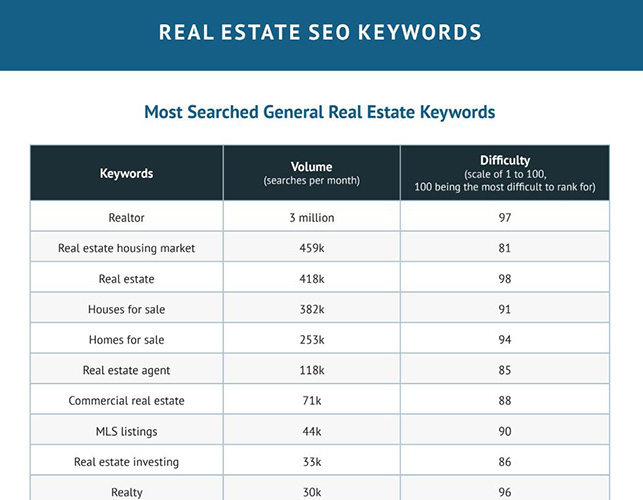Unlock the secret to real estate success with these must-have SEO keywords that will elevate your online presence instantly.

Image courtesy of via DALL-E 3
Table of Contents
Introduction to SEO Keywords
When you search for something on the internet, have you ever noticed the words you type into the search bar? Those words are called SEO keywords. But what exactly are SEO keywords and why are they so important, especially for real estate businesses? Let’s dive in and find out!
What are SEO Keywords?
SEO stands for Search Engine Optimization. In simple terms, SEO keywords are the words or phrases that people type into search engines like Google when they are looking for something. For example, if someone is searching for a new house to buy in a specific area, they might type in “3-bedroom house for sale in New York” – those words are the SEO keywords.
Why are SEO Keywords Important?
SEO keywords are like magic words that help your real estate website show up higher in search engine results. The higher your website ranks, the more people will see it when they search for properties online. This means more potential buyers or renters could find your listings and reach out to you!
How SEO Keywords Help in Real Estate
Imagine you have a beautiful house listed on your real estate website. By using the right SEO keywords like “modern home in Los Angeles”, you can reach people who are specifically looking for that type of property in that location. This increases the chances of your listing being seen by the right audience, leading to more inquiries and potential sales.
Choosing the Right Keywords for Real Estate
When it comes to choosing the right keywords for your real estate business, the first step is to understand your audience. Your keywords should reflect what potential buyers or sellers might be searching for online. Think about what phrases they would use when looking for properties or real estate services.
Using Keyword Tools
There are several tools available to help you find the best keywords for your real estate website. Tools like Google Keyword Planner, SEMrush, or Ahrefs can provide valuable insights into search volume, competition, and related keywords. By using these tools, you can discover which keywords are most relevant to your target audience.
Long-Tail Keywords
Long-tail keywords are specific phrases that are more detailed and targeted compared to short, generic keywords. For example, instead of using a broad term like “real estate,” you could use a long-tail keyword like “3-bedroom house for sale in New York City.” These longer phrases may have less search volume, but they often have higher conversion rates because they attract more qualified leads.
Implementing Keywords on Your Real Estate Website
Title Tags and Meta Descriptions
When it comes to optimizing your real estate website with SEO keywords, one of the key areas to focus on is your title tags and meta descriptions. These elements play a crucial role in telling search engines what your page is about, so be sure to include relevant keywords that accurately describe the content of the page.
Content and Headlines
Another important aspect of implementing keywords on your real estate website is to ensure that they are incorporated naturally within your content and headlines. Avoid keyword stuffing, which can hurt your rankings, and instead, aim for a good balance of using keywords that are relevant to your target audience.
Image Alt Text
Don’t forget about the images on your website! Adding descriptive alt text to your images not only improves accessibility for users but also provides another opportunity to include relevant keywords. Make sure that the alt text accurately describes the image and includes your targeted keywords for better SEO performance.
Using Local SEO Keywords
Local SEO keywords are crucial for real estate businesses because they help target potential clients in specific geographic areas. By using local keywords, such as city names, neighborhoods, or landmarks, you can attract people who are looking for properties in those locations. This increases the chances of your real estate listings being seen by the right audience.

Image courtesy of via Google Images
Including Location in Your Keywords
When incorporating local keywords into your content, make sure to include specific location details that potential clients may use in their searches. For example, if you specialize in selling homes in a particular neighborhood, include the neighborhood name in your keywords. This way, when someone searches for real estate in that area, your listings are more likely to appear in the results.
Google My Business
An essential tool for optimizing your local SEO is Google My Business. By creating a profile for your real estate business on Google My Business, you can improve your visibility in local search results. Make sure to include accurate contact information, business hours, and a description of your services. Encourage satisfied clients to leave positive reviews on your profile, as this can boost your credibility and attract more potential customers.
SEO Keyword Mistakes to Avoid
Keyword stuffing is when you use a lot of the same keyword over and over again in your content. It might seem like a good idea to include your keyword as many times as possible, but search engines are smart and can tell when you’re trying to game the system. Not only does keyword stuffing make your content sound awkward and robotic, but it can also lead to penalties from search engines, hurting your website’s ranking. So, remember to use keywords naturally and in a way that makes sense for your readers.
Ignoring Long-Tail Keywords
Long-tail keywords are longer and more specific phrases that people are likely to use when they’re closer to making a purchase. While short, broad keywords are essential, don’t make the mistake of ignoring long-tail keywords. These longer phrases can help you target a more specific audience and improve your chances of attracting high-quality leads. So, make sure to include a mix of short and long-tail keywords in your SEO strategy.
Not Updating Keywords
Keywords are not set in stone. Trends change, new terms emerge, and search behavior evolves. If you’re not updating your keywords regularly, you could be missing out on valuable opportunities to reach your target audience. Keep an eye on keyword performance, monitor changes in search trends, and adjust your keyword strategy accordingly. By staying up-to-date with your keyword research, you can ensure that your content remains relevant and continues to attract visitors to your real estate website.
Monitoring and Analyzing Keyword Performance
After selecting the right keywords for your real estate business and implementing them on your website, the next crucial step is to monitor and analyze their performance. Tracking how your chosen keywords are performing can help you fine-tune your SEO strategy and improve your website’s visibility to potential clients.

Image courtesy of via Google Images
Using Analytics Tools
One of the most effective ways to monitor keyword performance is by using analytics tools. These tools provide valuable insights into how your keywords are driving traffic to your site and how users are interacting with your content. Popular tools like Google Analytics and SEMrush can show you which keywords are generating the most clicks and conversions, helping you identify what is working and what may need adjustments.
Understanding Metrics
When analyzing keyword performance, it’s essential to pay attention to key metrics that can indicate the effectiveness of your SEO strategy. Metrics like organic traffic, bounce rate, conversion rate, and keyword ranking positions can give you a comprehensive view of how well your chosen keywords are performing. By understanding these metrics, you can make informed decisions on how to optimize your content and improve your SEO efforts.
Adjusting Strategies
Based on the insights gained from analytics tools and key metrics, it’s important to adjust your SEO strategies accordingly. If you notice that certain keywords are not driving as much traffic as expected, you may need to reevaluate your keyword selection or optimize your content for better visibility. Constantly monitoring and analyzing keyword performance allows you to adapt and refine your SEO tactics to stay competitive in the real estate market.
Future Trends in SEO Keywords for Real Estate
As technology continues to evolve, so do the trends in SEO keywords for the real estate industry. Here are some future trends that real estate businesses should keep an eye on:
Voice Search
One of the emerging trends in SEO keywords for real estate is the rise of voice search. With the increasing popularity of virtual assistants like Siri, Alexa, and Google Assistant, more people are using voice commands to search for properties. Real estate businesses need to optimize their keywords for natural language queries to better align with how people speak when using voice search.
Artificial Intelligence
Artificial Intelligence (AI) is reshaping the way SEO operates. AI-powered tools can analyze vast amounts of data to identify patterns and trends that humans might miss. Real estate businesses can leverage AI to understand consumer behavior, predict market trends, and customize keyword strategies for better visibility and engagement.
Mobile Optimization
With an increasing number of users browsing on smartphones and tablets, mobile optimization is becoming more critical for SEO success in real estate. Mobile-friendly websites tend to rank higher in search engine results, so real estate businesses should ensure that their websites are optimized for mobile devices and that their keywords are tailored for mobile searches.
Conclusion
In this article, we’ve explored the crucial role of SEO keywords in the success of real estate businesses. We learned that SEO keywords are specific words or phrases that help search engines understand the content of a website, making it easier for potential customers to find your listings online. By choosing the right keywords and implementing them strategically, real estate professionals can significantly improve their website’s visibility and attract more leads.

Image courtesy of via Google Images
Final Tips
As a final piece of advice, remember that the key to a successful SEO keyword strategy is to continuously monitor and adjust your approach based on performance analytics. Make sure to regularly update your keywords, include long-tail and local keywords, and optimize your website for mobile devices. By staying informed about future trends in SEO, such as voice search and artificial intelligence, you can stay ahead of the competition and achieve real estate success online.
Want to turn these SEO insights into real results? Seorocket is an all-in-one AI SEO solution that uses the power of AI to analyze your competition and craft high-ranking content.
Seorocket offers a suite of powerful tools, including a Keyword Researcher to find the most profitable keywords, an AI Writer to generate unique and Google-friendly content, and an Automatic Publisher to schedule and publish your content directly to your website. Plus, you’ll get real-time performance tracking so you can see exactly what’s working and make adjustments as needed.
Stop just reading about SEO – take action with Seorocket and skyrocket your search rankings today. Sign up for a free trial and see the difference Seorocket can make for your website!
Frequently Asked Questions (FAQs)
What are SEO Keywords?
SEO keywords are specific words or phrases that people use when searching for information on search engines like Google. These keywords help websites like real estate businesses to appear in search results when potential customers are looking for properties or related services.
Why are SEO Keywords Important?
SEO keywords are important for real estate websites because they help improve visibility. By using the right keywords, real estate businesses can attract more visitors to their websites, increase leads, and ultimately generate more sales. It’s like having signposts that guide people to your real estate listings online.
How SEO Keywords Help in Real Estate
SEO keywords help real estate listings by making them more easily discoverable by potential buyers and sellers. When someone searches for “homes for sale in [location],” using the right keywords increases the chances of your real estate website appearing at the top of search results. This, in turn, can lead to more inquiries and successful transactions.







